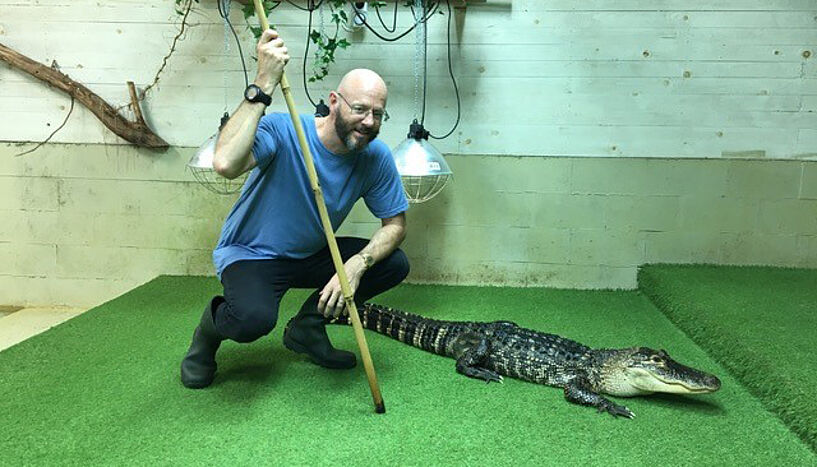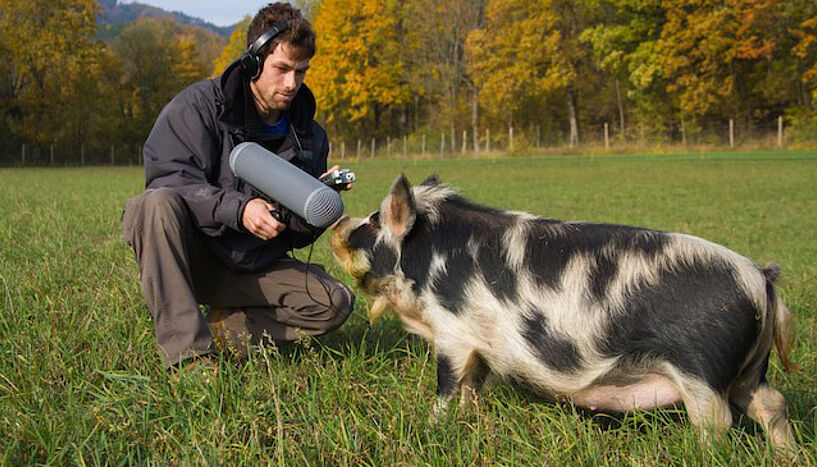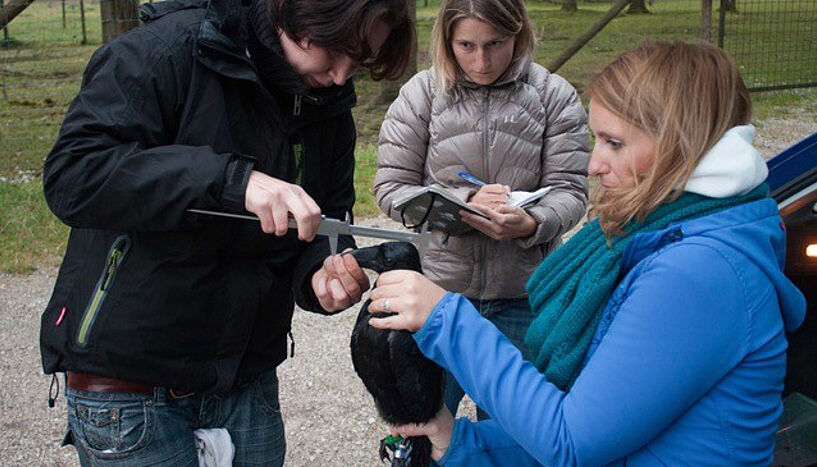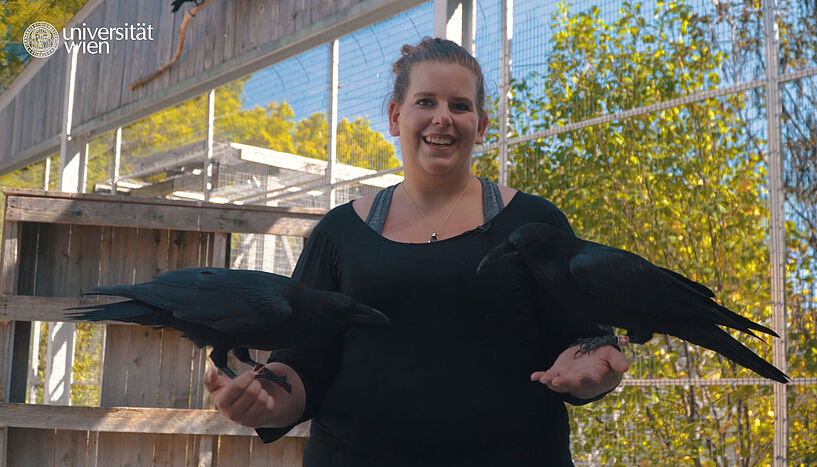What animals think
| 26. Juli 2021Tecumseh Fitch has shaped the term 'cognitive biology' for about 30 years. The Head of the Department of Behavioral and Cognitive Biology is part of the organisation team of this year's Congress of Cognitive Science (CogSci2021). We spoke with him about the conference's topic Comparative Cognition - Animal Minds and asked him why it is important in his field to put a spotlight on animals' minds.
uni:view: You were involved in the organisation of CogSci 2021. How did you choose this year's focus, and what are, generally speaking, the big questions in cognitive biology at the moment?
Tecumseh Fitch: Let me tell you some general things about the field first. In a way there have been two very different traditions for a long time in the study of animals. The American approach, on the one hand, developed from behaviourist psychology and continued to include elements from the field of neuroscience, where animals are essentially seen as stimulus response machines. The focus is on their nervous system and on the computations they perform. An equally important tradition is the European approach that focuses on ethology, i.e. on animal behaviour. This approach focuses much more on how animals behave, feel and fit into their environments. These two traditions have moved down parallel paths with psychology and cognitive science somehow stuck in between. Most psychologists study humans, however, those studying animals have been caught between these two opposing views.
What we have tried to do in Vienna is to combine these two perspectives. The aim is to not simply treat animals as robots with stimulus response properties, but to consider what they perceive and know, and use the same cognitive terminology as for humans when we talk about them. We have really pushed this forward and we have termed this approach ‘cognitive biology’.
Being able to name the main conference in the field of cognitive science “Animal Minds” is a big step for us. It is a breakthrough that shows that our approach is being accepted by mainstream cognitive scientists, even though 90 % of the researchers in the discipline study humans, not animals.
uni:view: Why is it useful to know how animals think and communicate? What do you hope to learn from their way of thinking and communicating?
Fitch: I do what I do because I think it is fascinating and important to understand how animals’ brains work. Moreover, I am convinced that understanding that gives us an insight into ourselves and into how our minds evolved. In general, people just find the idea of animal communication and animal cognition really interesting, so the research in this area can play a very important role in the public understanding of science.
Another reason is that there are very few aspects of the human mind that can be understood in a context other than a biological one. Every aspect of how our brain works, every neurotransmitter, every neural cell, every neural firing – we learned almost everything that we know about our brains from studying animal models. Animal research provides the basis for all psychiatry, for all medical applications of neuroscience, for drugs to treat depression, sleep disorders or dementia.
uni:view: You are an expert on acoustic communication in vertebrates. You compare how animals of this type produce vocal sounds, and what the similarities and differences between the species are, also in comparison with humans. What are the most interesting facts that you found out about this topic so far?
Fitch: Most of our work has shown how similar the vocal apparatus of humans is to that of most animals, ranging from elephants and whales to bats. Most mammals produce sounds using the same basic principles, a larynx and a vocal tract, as well as the same acoustics and physiology as we humans do. When we sing or speak we produce sounds in the same way as a dog does when it barks, or an elephant when it produces an infrasonic rumble, or a bat when it produces its ultrasonic echolocation call.
In addition, animals can sometimes imitate us. An Asian elephant named Khoshik can imitate human speech. It does so by sticking its trunk into its mouth, which is quite bizarre. Of course, also birds can imitate speech quite well, using a totally different mechanism. In all of these cases the difference is not the vocal apparatus itself, but the brain in control. So much about the similarities. When it comes to the differences, it is about neural innovations, about the control that our brain has over the apparatus. If a dog or cat possessed a human brain, they could speak perfectly well. It is the brain and the neural connections between the brain and the vocal apparatus that make the difference.
26. - 29. July 2021: CogSci 2021 Virtual Meeting
43rd Annual Meeting of the Cognitive Science Society "Comparative Cognition-Animal Minds"
Programme
Speakers
uni:view: Talking about the conference… Who are the speakers and what can participants expect to learn?
Fitch: Friederike Range is an expert on wolves and dogs. She is interested in the cognitive changes that went along with domestication. Onur Güntürkün is one of the major experts on bird cognition and particularly on bird brains. He will talk about mirror recognition in birds and hemispheric differences (differences between the two sides of the brain) in different species. Julia Fisher will give a lecture about what happens in the brains of monkeys as they age. She has worked with primates all her life. Erich Jarvis is one of the world leaders in bird song research, focusing especially on bird brains and the genes involved in song learning.
uni:view: Due to the coronavirus pandemic, the congress takes place mostly online. How many participants from how many countries do you expect to take part?
Fitch: So far 1700 participants registered, scientists from literally all around the world. Most participants will join us from the US, UK and Europe, but we also have registrations from Mongolia, India, Africa and from islands of which I have never even heard. That is one of the virtues of having an online conference: People who could not afford to take part are now able to participate.
uni:view: Thank you very much for your time! (AK)
Tecumseh Fitch is an evolutionary biologist and cognitive scientist. He is Professor of Cognitive Biology at the University of Vienna. His interests include bioacoustics and biolinguistics, specifically the evolution of speech, language and music. Tecumseh Fitch is Deputy Speaker of the Vienna Cognitive Science Hub, a network of researchers at the University of Vienna active in various disciplines of Cognitive Science and Cognitive Neuroscience. He is one of the organizers of the COGSCI 2021 conference, together with Claus Lamm, Head of the Social, Cognitive and Affective Neuroscience Unit (Faculty of Psychology), Helmut Leder, Head of the Vienna Cognitive Science Hub and Kristin Teßmar-Raible, Research Group leader at the University of Vienna and the Max Perutz Labs.







